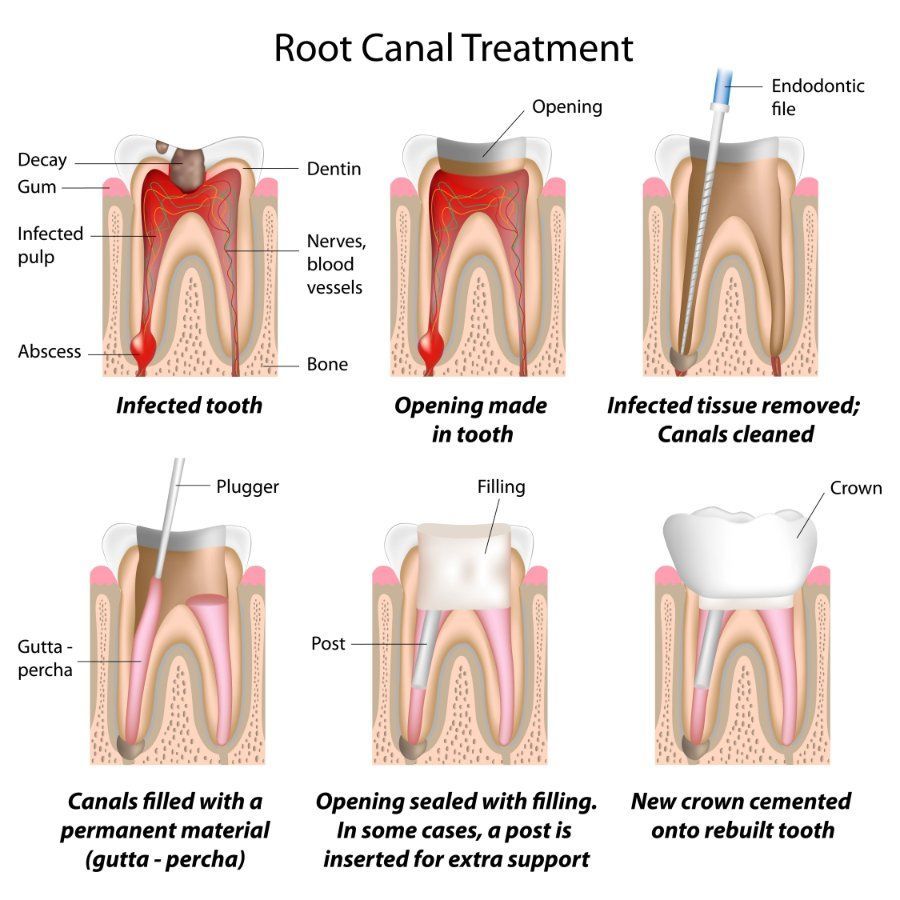Endodontics or Root Canals

A root canal is an endodontic treatment that removes inflamed or infected pulp from inside the tooth. The goal of root canal treatment is to save natural teeth while also preventing further damage and reinfection of the tooth.
By addressing the infection in the pulp early, you can avoid more extensive dental procedures, such as tooth extraction and replacement.
At Hampden Ave Dental, we perform the root canal procedure using advanced technology, ensuring your experience is stress-free and comfortable. Our team provides expert, gentle care to save your natural tooth and restore your oral health.
Services
Understanding Root Canals
Under the outer layers of your tooth, which include the hard enamel and the underlying dentin, there is a soft tissue called the tooth pulp. This pulp is made up of blood vessels, nerves, and connective tissue, and it plays a key role in helping your tooth develop during childhood.
Bacteria present in your mouth can spread into the tooth when this pulp is damaged, causing pain, swelling, or even an abscess. Causes of damage to your tooth pulp may include:
- A deep cavity that has not been treated
- Multiple procedures performed on the same tooth
- Crack or chip in the tooth
- Injury to the tooth, even if there's no visible damage
If the affected pulp is not removed, the infection can spread, leading to increased pain, swelling, and even tooth loss. In some cases, it can also affect nearby teeth or enter the bloodstream, causing more serious health issues.
Since a fully developed tooth can remain intact even without the pulp, root canal treatment is the best way to save the tooth.
Root canal treatment includes:
- Removing the infected or inflamed pulp
- Cleaning and disinfecting the inside of the tooth
- Filling and sealing the space to prevent infection from coming back
This procedure helps preserve your natural tooth, preventing the need for tooth extraction and maintaining your overall dental function and appearance.
Signs You May Need a Root Canal
If you have any of the following symptoms, your tooth may be infected and could require a root canal:
- Persistent tooth pain
- Pain that spreads to your jaw, face, or other teeth
- Pain when biting or touching the tooth
- Gum swelling, redness, or tenderness near the affected area
- Pimple-like bump on the gums
- Sensitivity to hot or cold food
- Swelling in the jaw
- Darkened or discolored teeth
- Weakened or loose tooth
If you are experiencing any of these symptoms, it’s important to see your dentist as soon as possible to prevent serious complications. Sometimes, an infection in the tooth can also develop without any noticeable symptoms, making regular dental check-ups essential for early detection.
Our Root Canal Treatment Process
Our providers ensure that your root canal procedure is as seamless, painless, and worry-free as possible. Our expert team uses advanced techniques and modern technology to effectively treat infection and save your natural tooth.
Before Root Canal Procedure
During your initial consultation, we perform a thorough examination and order digital X-rays to assess the extent of infection or damage. We may also recommend additional tests to determine if the pulp is infected or inflamed to confirm whether a root canal is necessary.
Our team explains the findings and discusses your treatment options in detail. If a root canal is necessary, we walk you through each step of the process to ensure you are comfortable and informed.
During Root Canal Procedure

When you arrive for your root canal appointment, our team will guide you through the process, answer any questions you may have, and make sure you are comfortable before beginning the procedure. We use gentle techniques and modern technology to make your experience as pleasant and pain-free as possible.
The whole procedure typically takes 60–90 minutes, depending on the complexity of your case.
Step 1: Numbing the Area
Before starting the procedure, we numb the area by applying a small amount of numbing gel to your gums near the affected tooth. Once the gel has taken effect, a local anesthetic is injected into the area.
You’ll stay awake throughout the procedure, but the anesthetic will ensure you experience minimal discomfort.
Step 2: Removing the Infected Pulp
Once your tooth is completely numb, we create a small opening in the top of the tooth to access the damaged pulp. We use specialized tools to carefully remove the infected or inflamed tissue and thoroughly clean out all the inner canals of the tooth.
Step 3: Disinfecting & Sealing the Tooth
After removing the pulp, our provider may apply a topical antibiotic inside the tooth to eliminate any remaining bacteria and prevent reinfection. Once the canals are fully cleaned and disinfected, they will be filled and sealed with a rubber-like material called gutta-percha. In some cases, an oral antibiotic may also be prescribed.
Step 4: Temporary Filling
We place a soft, temporary filling over the opening in your tooth to prevent bacteria and saliva from entering the canals while your tooth heals. You may need a permanent filling or a crown during your follow-up visit to fully restore the tooth’s function and strength.
After the Procedure
Once the numbing medication wears off, you may experience some mild soreness and swelling in your tooth and gums. This is completely normal and will subside within a few days as your body heals. We recommend managing any discomfort with over-the-counter pain relievers.
Most patients can return to their normal routine the day after their procedure. We provide detailed aftercare instructions and encourage you to reach out if you have any concerns during recovery.
A few days after your root canal, we schedule a follow-up appointment. During this visit, we may take X-rays to ensure the infection has cleared and replace your temporary filling with a permanent one. We may also recommend a dental crown.
Root Canal Treatment in Lakewood, CO
With advanced technology, expert precision, and a patient-first approach, we ensure that your root canal treatment is both effective and stress-free. Our goal is to preserve your natural teeth, eliminate pain, and restore your oral health so you can smile with confidence.
To schedule a consultation for root canal treatment, please call us at 303-985-1263 or request an appointment online.
Frequently Asked Questions
Is a root canal treatment painful?
Root canal treatment may cause some discomfort, particularly when the anesthesia is administered. However, the root canal isn't more painful than a regular dental procedure, such as getting a wisdom tooth removed.
Most patients report relief after a root canal since the procedure removes the affected pulp. It’s normal for your tooth to feel a bit sensitive for a few days after a root canal, but this should improve gradually.
How long does it take to recover from a root canal?
Most patients recover quickly after a root canal. While the numbness from the anesthesia typically lasts 2-4 hours, you can usually return to work or school the next day.
How do I know if I really need a root canal?
If you're experiencing persistent pain, sensitivity, or swelling, scheduling a dental exam is useful. A medical exam of your teeth by a dental expert can help identify the underlying problem and determine if a root canal is necessary.
Can I eat after a root canal?
If you're experiencing persistent pain, sensitivity, or swelling, scheduling a dental exam is useful. A medical exam of your teeth by a dental expert can help identify the underlying problem and determine if a root canal is necessary.
Can I eat after a root canal?
Yes! However, we recommend waiting until the anesthesia wears off before eating to avoid biting your tongue or cheek. Soft foods are best for the first day or two.
What happens if I delay root canal treatment?
Postponing a root canal can lead to serious dental complications. If the infected pulp is not treated, you risk losing the tooth. The infection in your tooth pulp can also spread to neighboring teeth, causing further damage. In more severe cases, the infection may extend to your jawbone, leading to pain, swelling, and potential long-term oral health issues.

